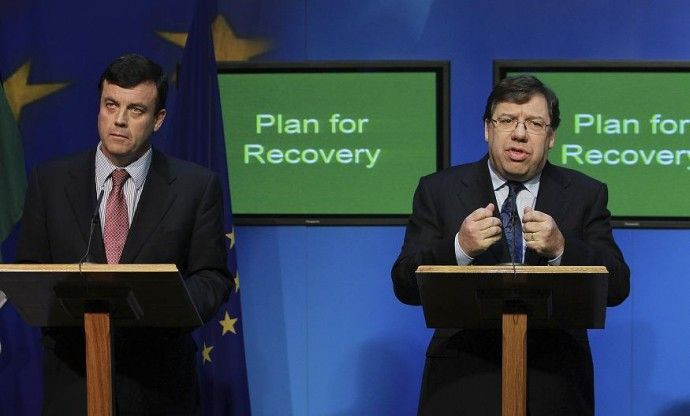Ireland presents austerity budget to meet terms of EU/IMF bailout

The Irish government has presented what is likely the toughest austerity budget in its history, comprising spending cuts of 6-billion euros ($8-billion) and an increase in taxes, in addition to other measures already outlines last month in the so-called “National Recovery Plan.”
All told, the government seeks to cut spending by a total of 15-billion euros.
The budget was compiled in order to reduce the country’s enormous budget deficit of 32 percent of GDP to 3 percent by 2014 and thereby meet the terms of the 85-billion euro bailout package from the European Union (EU) and International Monetary Fund (IMF)
The latest items of the budget include: reductions in child benefits to 140 euros per month from 150; a slashing of the salaries of the Prime Minister and other government ministers; a new income tax system; and extra fuel allowance payments
However, the budget also provides for no change in the 12.5 percent corporate tax rate (a measure that has long attracted foreign companies to Irish shores); and no reduction in state pensions.
Under the new income tax system, the government seeks to lower thresholds, noting that currently about 45 percent of the Irish do not pay any taxes. Also, tax relief enjoyed by the high-income earners will either be abolished or amended. However, the top marginal rate of tax will be kept at 52 percent.
In addition, the value-added tax will increase to 23 percent by 2014, in hopes of generating 620-million euros of revenue annually.
In a speech to the Parliament as he presented the budget finance minister Brian Lenihan noted the government decided to spare the creditors of the country’s troubled banks from any losses on their loans – a measure that is believed to have been insisted upon by the EU in order to prevent a European banking crisis.
Regarding the state pension, Lenihan noted “we have significantly increased the state pension over the last ten years and it is the government's view that the security this has brought to older people should be preserved.”
However, the pensions of retired public sector employees will be cut (saving an estimated 100-million euros every year). These cuts will be “graduated” under the following scheme: the first 12,000 euro will not be touched; the next tranche up to 24,000 euro will be reduced by 6 percent; the next tranche up to 60,000 euro will be cut by 9 percent. Above that level will see a 12 percent cut
Also, the salary of the Prime Minister will be slashed by more than 14,000 euros per year, while the pay of other Ministers will be reduced by over 10,000 euros annually.
The government will also limit public sector pay at 250,000 euros.
The scale of this adjustment is demanding, but it demonstrates the seriousness of our intent, Lenihan said about the budget.
Although the ruling Fianna Fail/Green party coalition has only a slight majority in the Irish parliament, the budget is still expected to be passed in voting that commences Tuesday night.
Once such approval occurs, the first tranche of the EU/IMF bailout funds will be triggered and released.
If the budget is not passed, a new general election will be called and any funds from the EU/IMF would be suspended, pending the formation of a new government.
© Copyright IBTimes 2024. All rights reserved.











